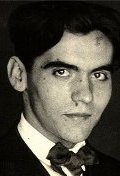Skip to: site menu | section menu | main content
Welcome To Democracy And Socialism .Com
Things should be made as simple as possible, but not any simpler- Albert Einstein
Federico Garcia Lorca (1898 -1936) |
 |
Federico Garcia Lorca was a great Spanish poet and writer, a passionate defender of the young Spanish Republic, and a staunch fighter for social justice in Spain and the whole world. He is well-known by his writings all over the world. His works are translated in different languages and is inspiring many poets and writers of our time.
A man ahead of his time, Garcia Lorca created a wide variety of poetry, novels, playwrights, short stories, paintings, drawings and musical compositions, in his short 38 years lifetime.
Garcia Lorca was born on June 5th, in the village of Fuente Vaqueros in the province of Granada. He first read law in the University of Granada, and then continued his education in the University of Madrid, where he earned a degree in law in 1923. At the same time, he also studied music and became an expert pianist and guitar player.
Garcia Lorca wrote his first play in 1919-1920, but became famous with his only historical drama “Mariana Pineda” in 1923. The main character of the book is Mariana Pineda, a historical figure and Spanish national heroine who was executed for embroidering a revolutionary flag.
By 1928, with the publication of “The Gypsy Ballads”, Lorca was the best known of all Spanish poets. He was a leading member of a group of writers who advocated avant-gardism in literature, the “Generation of 1927”.
Lorca was a friend and inspiring figure of writers Juan Ramon Jimenez and Pablo Neruda. Lorca worked with Catalan painter Salvador Dali and film director Louis Bunuel.
In 1929, Lorca was sent by his parents to the US, for the purpose of having a relaxing time out of Spain’s turbulent times. He stayed mostly in New York City, studied for a short time at Colombia University School of General Studies. In New York, he wrote his collection of poems “Poet in New York”, and two plays “When Five Years Pass”, and “The Public”. In The Public, he attacked the commercial theater and the entire social order. In the “Poet in New York” he praised American poets especially Walt Whitman (1819-1892), but he also condemned the frightening, physically and spiritually corrupted city. He traveled to Havana to experience the harmony of a more primitive life.
After a short stay in Cuba, Lorca was back in Spain by 1931. His return coincided with the fall of the dictatorship of Primo de Rivera (1923-30), and the establishment of the Second Spanish Republic. He became actively involved in the revolutionary movement and was appointed by the provisional government as the director of a university student theater company, La Barraca. La Barraca was charged with touring Spain’s remotest rural areas. La Barraca, an illuminative theater, conveyed the most progressive ideas of land reform, universal suffrage, freedom of speech, economic justice and women’s rights to the most conservative parts of the Spain.
While touring with La Barraca, Lorca wrote his best known plays; the ‘rural trilogy’ of “Blood Wedding”, “Yerma” and “The House of Bernarda Alba”. In these plays he dealt especially with the repression of women in the Spanish society, particularly in the rural areas.
In 1934, with the new center-right government, La Barraca’s subsidies were cut in half and its last performance was in April 1936.
Uprising of reactionary forces of the Catholic Church as the big land-lord, monarchists, land owners and bourgeoisie against the elected left-wing Popular Front government, triggered the Spanish Civil War of 1936-39.
Under the command of General Francisco Franco, the fascist Falangist forces along with the well-trained Spanish army dispatched from Morocco, systemically murdered hundreds of thousands of the supporters of the Republic and buried them in unmarked mass graves even after the war was won by the fascists in 1939.
Three days before the full scale Civil War. Lorca left Madrid for his hometown Granada. It was soon that Granada fell in the hands of Falangists. Lorca and his brother-in –law the socialist mayor of Granada were arrested by the “Black Squads”. According to the boaster perpetrators and some eyewitnesses, on August 19, 1936, Lorca and his comrades were beaten, shot and buried in a mass grave, which they had been forced to dig by themselves.
Franco grabbed power by the direct support of the Nazi Germany and the fascist regimes of Italy and Portugal. After the end of WWII, he held on to power until his death in 1975, by the backing of US, and UK imperialists.
Only after the dismantlement of Franco’s fascist regime, the life and death of F.G. Lorca could be openly discussed in Spain and his uncensored works were released to the public.
In the October 2008, Judge Bultasar Garzon has launched an investigation into the fate of more than half a million people who disappeared during the Civil War and 36 years of Franco’s criminal regime. Lorca is one of those who disappeared.
Lorca’s other major works:
-
Impression and Landscapes, 1918
-
The Butterfly’s Evil Spell, 1920
-
Poem of Deep Song, 1921
-
Book of Poems, 1921
-
Songs, 1927
-
The Love of Perlimplin and Belisa in his Garden, 1928
-
Buster Keaton’s Promenade, 1928
-
The Shoemaker’s Prodigious Wife, 1930
-
The Puppet Play of Don Cristobal, 1931
-
How a City Sings from November to November, 1933
-
Dona Rosa the Spinster, 1935
-
Six Galician Poems, 1935
-
Play Without a Title, 1936
-
Sonnets of Dark Love, 1936